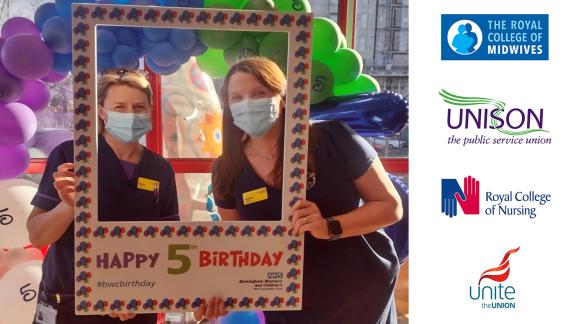Employer with heart : Pregnancy loss policy in partnership

Overview
Birmingham Women's and Children's NHS Trust worked with trade union representatives to develop and launch an innovative policy offering additional paid leave to parents who lose their babies - the first of its kind in the NHS and UK public sector.
Background
The trust is a UK fertility centre and supports 2,000 families each year through the tragedy of pregnancy loss. The trust has an 82 per cent female workforce and has observed a rapid increase in turnover. Pregnancy loss has a serious impact on individuals and can lead to long term absence and mental health conditions, including PTSD. The trust wanted to tackle the taboo of talking about a baby dying, and their trade unions wanted to support their members and work in partnership to shine a light on this hidden grief.
Action taken
The trust took the following actions:
- researched other organisations worldwide to see what they were doing for colleagues who suffer a miscarriage
- used this learning to draft changes to their parental leave policy, proposing ten additional days paid leave for mothers and five additional paid days for partners following baby loss
- signed The Smallest Things Charter, which offers parents of premature babies additional paid leave
- worked with their joint consultative and negotiation committee to develop the trust’s new policy
- got the support of finance colleagues by highlighting the impact of baby loss on sickness absence and turnover
- engaged clinical colleagues with the evidence from Tommy’s charity to support the business case.
The role of partnership working
Trade unions in the trust have a strong nursing, midwifery and allied health professional representation. Utilising the knowledge of trade union experts helped with preparing the new policy. Trade union representatives also provided feedback on the use of language to ensure it was fully inclusive and advised on how the policy should be implemented and evaluated.
The trust commissioned training and communications on the policy for line managers in response to guidance given by trade unions. The trust also shared the lived experience of staff to aid line managers’ understanding of their colleagues’ experiences, which was suggested and supported by trade unions.
A joint communications plan was agreed, and press comments were supplied by trade unions representatives, the trust’s director of midwifery and miscarriage experts. The policy was launched in partnership with the trust’s board and trade unions. Trade unions shared good practice with other trusts via their own unions and were key to the successful launch of the policy using mechanisms such as social media to increase awareness.
Results and benefits
The policy has garnered interest from organisations across the UK. To date, six NHS trusts, one police force and one private sector organisation have adopted the policy, covering over 60,000 staff. Many more NHS trusts are in the process of adopting the policy with the support of Birmingham Women's and Children's NHS Trust and their trade unions. There is the potential for 150,000 members of staff to be covered by the policy across organisations currently in contact with the trust.
The policy launch story went worldwide and received over seven million hits on global news sites. The chief executive's tweet from the @BWC_NHS Twitter account on the launch of the policy received 2.5 million hits, and it was the trust’s most successful news story in ten years in terms of worldwide reach.
The trust is a founding member of Tommy’s Pregnancy and Parenting at Work support programme and has subsequently signed the Miscarriage Charter alongside another local trust.
Since the policy launch, there has been an outpouring of grief and healing, with colleagues sharing that they feel valued and proud to be a part of the organisation.
Sharing learning
Lessons learnt from the project
The trust learned that:
- working in partnership with trade union colleagues allows for faster decision making and better policy development, benefiting colleagues
- trade unions are instrumental in communicating offers to members and holding line managers and the trust leaders to account over implementation
- the approach can be easily replicated in other NHS trusts provided there is a commitment to partnership working and trade unions can shape policies from their inception.
How the project will be sustained going forward
The trust will:
- continue to share learning and have close partnership working
- continue to coach organisations across the UK and support them to adopt the policy in partnership
- continue to lead in research and promote best practice and learn from others.
Further information
For more information, contact Raffaela Goodby, Birmingham Women's and Children's NHS Trust.



